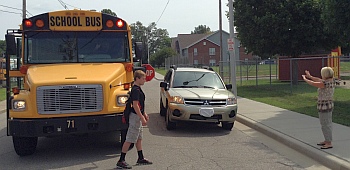 Governor Eric J. Holcomb Thursday announced the results of the overtime patrols that were conducted by nearly 40 law enforcement agencies to create safer school bus stops around the state.
Governor Eric J. Holcomb Thursday announced the results of the overtime patrols that were conducted by nearly 40 law enforcement agencies to create safer school bus stops around the state.
The departments, which were awarded Stop Arm Violation Enforcement (SAVE) grants, issued a total of 2,675 citations and 1,430 warnings during the two-month mobilization, which kicked off at the start of the 2019 school year.
The SAVE program is funded by the National Highway Transportation Safety Administration and administered by the Indiana Criminal Justice Institute.
“There’s no excuse for driving dangerously or distracted around a school bus, but there are consequences,” Gov. Holcomb said. “Parents shouldn’t have to worry about the safety of their child going to and from school, which is why we’ll continue to make improving bus stop safety a priority.”
As a result of the funding, officers conducted an additional 2,057 patrols and worked an extra 5,690 hours, targeting speeding, aggressive driving, stop-arm and other traffic violations along bus stops and routes.
Out of the thousands of citations issued, 453 were stop arm violations and another 1,239 involved speeding. Other larger citation categories included failing to stop at a stop sign or stop light (173), not wearing a seat belt (134) and equipment violations (113).
ICJI Executive Director Devon McDonald said that the SAVE program, a first for Indiana and surrounding states, offers a unique, innovative approach to improving school bus stop safety and can be used as a model by other states.
“A critical component of the SAVE program was the collaboration that took place between the schools, bus operators and local law enforcement,” McDonald said. “Together, they identified problem areas and routes, allowing them to coordinate their efforts, and focus their attention and resources strategically.”
McDonald added that while police officers are watching every day for motorists, who are speeding or checking their phones while driving near buses, it’s imperative for drivers to slow down and pay attention to the road, especially in school zones.
State law requires a school bus to use flashing lights and extend its stop arm while loading and unloading students. The law also requires drivers to stop while the arm is extended. On highways divided by a physical barrier or unimproved median, vehicles traveling in the opposite direction as the school bus may proceed with due caution.
ICJI plans to start accepting applications for the next round of SAVE grant funding early next week.
Visit www.cji.in.gov to learn more about the Indiana Criminal Justice Institute and the SAVE program.














